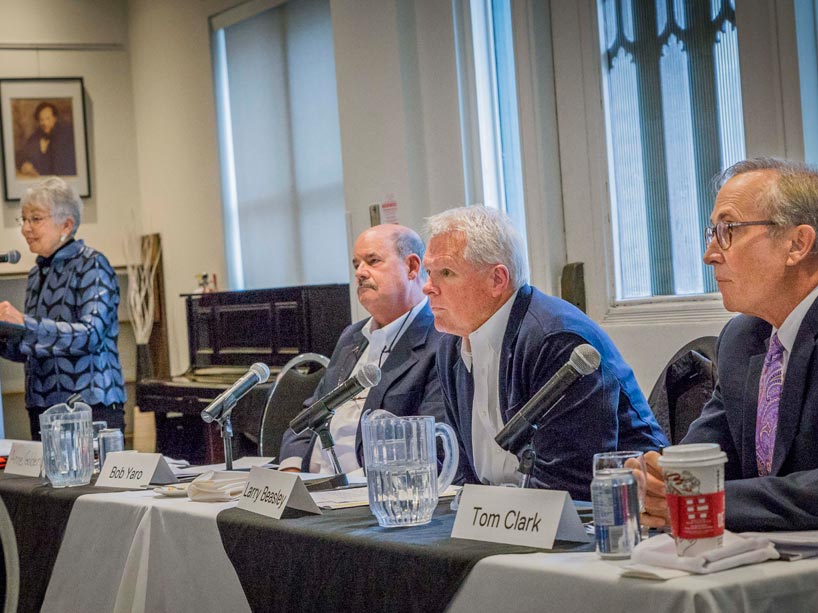The politics of transit

The Ryerson City Building Institute hosted “Breaking Transit Gridlock” on November 22. From left: moderator Anne Golden; Empire State Transportation Alliance founder Robert Yaro; former Vancouver chief planner Larry Beasley; and Metro Denver Network founder Tom Clark.
We all know that transit needs to be fixed—but what are the problems, and how do we solve them? On November 22 at Oakham House, the Ryerson City Building Institute (external link) hosted “Breaking Transit Governance Gridlock,” an all-star panel to discuss the problems—and opportunities—facing public transportation.
“The issues that are impeding progress here are more and more apparent,” said moderator Anne Golden, former CEO of the Conference Board of Canada, current Metrolinx board member and a Ryerson Distinguished Visiting Scholar. “Controversial decisions, the poster child being Scarborough; the intrusion of politics into transit decisions; the lack of sufficient and sustainable funding. Governance issues and tensions: Metrolinx versus the province; a metropolitan area with nine transit agencies.”
What is Toronto’s biggest roadblock? “We don’t have a common set of values when it comes to transit culture,” said Golden. “There are people who will still argue, ‘Sprawl’s good—I want to live where I want to live, and don’t bother me about the numbers.’” But she also pointed to the King Street pilot program, which “I don’t think would have been possible a few years ago, and it’s getting rave reviews.”
Toronto is not the only city with transit woes. In New York City, recent subway delays and infrastructure failures have made headlines (external link) . Robert Yaro, president emeritus of the New York-based Regional Plan Association and co-founder of the Empire State Transportation Alliance, acknowledged that the city had grown complacent. “Every spring my wife comes out with a bunch of paper towels and buckets of Windex and so forth and says, ‘It’s time to wash the windows.’ My response is, ‘Well, I just did that last fall.’ ‘Okay, time to do it again.’”
Yaro attributed the transit system’s woes to a combination of crumbling infrastructure and conflicting interests between city and state governments. “It really came back to the same problem you have: a very large city in a province where Greater Toronto represents maybe half the population and 60, 70 per cent of the economy. That’s New York City in New York State. You get this clash between Queen’s Park and the city, or Albany and Manhattan. … We disinvested in the underlying infrastructure of power systems and signalling systems and so forth, leading to a series of delayed trains.”
Noting that “most citizens are telling us that they’re tapped out on taxes,” former Vancouver chief planner Larry Beasley called for funding transit initiatives through more joint ventures with the private sector: Not only can you motivate them to do things in the way that you’d like them, but you can also share in the profits. … You can use a provincial crown corporation under, say, Metrolinx control to actually have a development company that could land a joint-venture with the private sector and enjoy not only part of the profits, but also motivate people to do development in the right places—which is transit-oriented development.”
However, a grassroots success story came from Tom Clark, founder of the Metro Denver Network, who led a long but successful seven-year campaign to convince citizens to vote in a plebiscite for new transit—and new taxes. The network’s strategy was to build a constituency through education: “You’ve got the advocate groups going out in public and showing up at flea markets with a crazy t-shirt that actually showed where all the lines went,” said Clark. “I got tired of people pointing at my chest! The idea behind it was to give people a sense that this is the way it was going to be.”
Bob Yaro concluded the event by suggesting that on the issue of transit, politicians and bureaucrats do not need to be natural enemies. “Politicians have to be in the room and buy into this thing—we live in a democratic society. But don’t be surprised by that idea from Casablanca: ‘I’m shocked there’s gambling going on here!’ / ‘My god, there’s politics going on!’” What you want to do is bring them in on the large strategic questions, and then get the most talented people to run these organizations.”